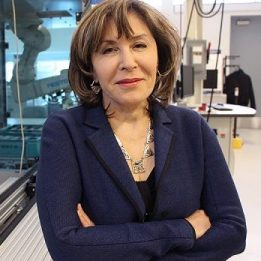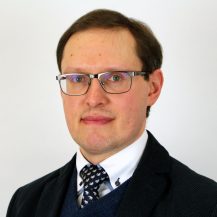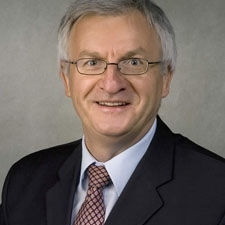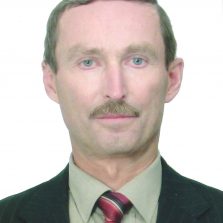FRSC, FIVA, FCAE, FCIRP, FCSME, FSME, PEng
Distinguished University Professor,
Director, Intelligent Manufacturing Systems (IMS) Centre,
Department of Mechanical, Automotive and Materials Engineering,
University of Windsor, Canada

Abstract: Innovation and transformative changes in products, manufacturing technologies, business strategies and manufacturing paradigms have profoundly changed the manufacturing systems. The shift to economically and environmentally sustainable manufacturing systems and using smart technologies for better support and complimentary collaboration between humans and machines is discussed. A vision for future intelligent adaptation and resilience of manufacturing systems in the face of change and disruptions is elaborated and its enablers are outlined. Perspectives and insights on related future research and role of humans in manufacturing systems are offered.
Biography:
Hoda ElMaraghy is a Distinguished University Professor and founding Director of the Intelligent Manufacturing Systems (IMS) Center at the University of Windsor where she became the first woman Dean of Engineering in Canada. She is member of the Order of Canada (O.C.) and the Order of Ontario (O.Ont.) for outstanding achievements and contributions to knowledge and industrial advancement. Professor ElMaraghy is a renowned scholar and research innovator, an inspiring educator, leader and role model, whose seminal contributions have been recognized nationally and internationally with numerous prestigious awards and accolades. Dr. ElMaraghy held Tier I Canada Research Chair in Manufacturing Systems for 14 years. She received an Honorary Doctorate from Chalmers University in Sweden. Her current research includes manufacturing systems paradigms; evolution and co-evolution/ co-development of products and manufacturing systems using principles of natural evolution. She supervised more than 100 researchers and has more than 500 publications. She delivered numerous keynote papers and serves on several scientific journals’ editorial boards.
Dr. ElMaraghy is a Fellow of the Royal Society of Canada (RSC), Royal Swedish Academy of Engineering Sciences (IVA), International Academy of Production Engineering (CIRP), Canadian Academy of Engineering (CAE), Canadian Society of Mechanical Engineers (CSME) and Society of Manufacturing Engineers (SME).

PhD, Technical Leader
Ford Global Data Insight & Analytics
Ford Motor Company, USA
Abstract: The presentation reviews several models to support the decisions in supply chain disruption management that are based on the automotive industry experience with COVID-19 impact. As the pandemic created waves of facility closures around the globe, it posed the significant challenges in planning the restart of the operations. The integration of the supply chain risk model, based on the time-to-survive and time-to-recover concepts, with epidemic prediction can provide insights into company recovery plans. Optimization models are created to seek the recovery plans that maximize margins and the robustness to the prediction error. The supply chain disruption response is closely related to product complexity management as material shortages require the allocation of limited supply between different models. The holistic optimization of supply chain and product complexity to minimize company financial impact is presented. During the COVID-19 pandemic, severe shortages of emergency medical and personal protective equipment have been observed. Many commercial companies, including automotive, stepped in to address these shortages repurposing their manufacturing and supply chain capacities. Capitalizing on the lessons learned, the opportunities for contingency planning for combined adaptation of healthcare and commercial supply chains for a pandemic response are discussed.
Biography:
Dr. Oleg Gusikhin is a Technical Leader at Ford Global Data, Insight and Analytics (GDI&A) Organization. Before joining GDI&A, he was the Manager and Technical Leader of the Advanced Connected Services and Mobility Applications Department at Ford Research & Advanced Engineering. He received his Ph.D. from the St. Petersburg Institute of Informatics and Automation of the Russian Academy of Sciences, MS in Electrical Engineering from St. Petersburg State Technical University, and an MBA from the Ross Business School at the University of Michigan. For over 20 years, he has been working at Ford Motor Company in different functional areas. During his tenure at Ford, Dr. Gusikhin has been involved in the design and implementation of advanced information technology and intelligent control for manufacturing and vehicle systems. Dr. Gusikhin is a Fellow of INFORMS and a Certified Fellow in Production and Inventory Management by American Production and Inventory Control Society. He is a recipient of two Henry Ford Technology Awards, 2014 INFORMS Daniel H. Wagner Prize and 2009 Institute of Industrial Engineers Transactions Best Application Paper Prize in Scheduling and Logistics. He is an Industry Vice-Chair of IFAC TC 5.2 Technical Committee “Manufacturing Modeling for Management and Control,” and a Lecturer in the Industrial and Operations Engineering department at the University of Michigan.

Abstract: In this talk, we discuss fundamental theoretical constructs and practical applications to engineer and manage disruption-resistant supply chain networks to mitigate the ripple effects in the context of the COVID-19 pandemic. We collate and review the existing knowledge in modeling the ripple effect in supply chains at different pandemic stages. Subsequently, we debate about extensions of the existing theories and practices of supply chain resilience towards viability. We present the Viable Supply Chain model and associated concepts of structure dynamics control, intertwined supply networks, and reconfigurable supply chains. Finally, we discuss the role of digital supply chain twins and platforms in managing resilience and viability at the times of super disruptions, and project the lessons learned during the COVID-19 pandemic on possible future stressors to supply chains such as climate change challenges.
Biography:
Prof. Dr. Dr. habil. Dmitry Ivanov is professor for Supply Chain and Operations Management, deputy director and executive board member of Institute for Logistics (IfL) at Berlin School of Economics and Law (Germany). His main research interests and results span the ripple effect in supply chains, supply chain resilience and viability, smart manufacturing and Industry 4.0, and digital supply chain twins.
He gained Dr., Dr. Sc., and Dr. habil. degrees and won several research excellence awards. His research record counts around 350 publications, with more than 100 papers in prestigious academic journals and the leading books “Global Supply Chain and Operations Management” (three editions), “Introduction to Supply Chain Resilience”, “Structural Dynamics and Resilience in Supply Chain Risk Management“, “Scheduling in Industry 4.0 and Cloud Manufacturing” and “Handbook of Ripple Effects in the Supply Chain“. He serves to international research community by leading working groups, tracks and sessions on the Supply Chain Resilience and Digital Supply Chain. He delivered invited plenary, keynote and panel talks at the conferences of INFORMS, IFPR, DSI, and IFAC. He co-edits International Journal of Integrated Supply Management and is an associate editor of the International Journal of Production Research, International Transactions in Operational Research, and International Journal of Systems Science, and guest editor in many international journals. He is Chairman of IFAC TC 5.2 “Manufacturing Modeling for Management and Control” and has been General Conference Chair of 9th IFAC MIM 2019 conference as well as IPC and advisory board member of over 60 international conferences.

Abstract: Digitization is profoundly impacting manufacturing enterprises. Two extreme enterprise architectures are emerging, open and integrated. The open architecture benefits from digitization of enterprise processes, supported by resource sharing and sustainability initiatives. The integrated architecture internalizes the benefits of digitization to maintain competitive advantage of an enterprise. Digitization as an enabler of cloud representation of enterprises of any size, from small to large, calls for modeling.
Model-based system engineering offers methodologies of interest to digital manufacturing. Applications of model-based system engineering in building enterprise models are presented. The opportunities and challenges of enterprise modeling are discussed. Building digital models is elaborate and could be expensive. Insights into autonomous building of such models are provided. Future developments in digital manufacturing are presented.
Biography:
Dr. Andrew Kusiak is a Professor in the Department of Mechanical and Industrial Engineering at The University of Iowa, Iowa City and Director of the Intelligent Systems Laboratory. He has chaired two departments, Industrial Engineering (1988-95) and Mechanical and Industrial Engineering (2010-15). His current research interests include applications of computational intelligence and big data in automation, manufacturing, product development, renewable energy, sustainability, and healthcare. He has published numerous books and hundreds of technical papers in journals sponsored by professional societies, such as the Association for the Advancement of Artificial Intelligence, the American Society of Mechanical Engineers, Institute of Industrial Engineers, Institute of Electrical and Electronics Engineers, Nature, and other societies. He speaks frequently at international meetings, conducts professional seminars, and consults for industrial corporations. Dr. Kusiak has served in elected professional society positions as well as various editorial boards of over fifty journals, including five different IEEE Transactions.
Besides his academic appointment at the University of Iowa, his past academic appointments, include the Technical University of Nova Scotia (now Dalhousie University) and the University of Manitoba in Canada. He has held distinguished research professorships at the Huazhong University of Science and Technology (China), University of Hong Kong (SAR), and King Abdulaziz University (Saudi Arabia) as well as visiting positions at the University of Lyon, Institut National Polytechnique de Grenoble, University of Nancy (France), and the University of Montreal (Canada). His graduate students have assumed prominent positions in academia and industry. Dr. Kusiak has co-advised PhD students at the University on Munich (Germany) and Institut National Polytechnique de Grenoble (France). His lab has hosted numerus visitors from different countries. Professor Kusiak is a Fellow of the Institute of Industrial and Systems Engineers and the Editor-in-Chief of the Journal of Intelligent Manufacturing.

Abstract: While manufacturing systems become more and more automated and robotized, full automation and robotization is unlikely to be achieved in the near future in many industries. Besides, many robot’s characteristics are similar to those of a human operator. We shall consider decision aspects of the workforce employment in the design, reconfiguration and operation of various manufacturing systems, analyse the relevant literature and determine the current research trends. The core object of this presentation is a generic manufacturing problem involving the workforce decisions. It can be formulated as follows.
There is an existing manufacturing system or a manufacturing system to be designed. A physical layout and a working equipment can be given, or they have to be decided within the same manufacturing system type. The traditional manufacturing types are dedicated manufacturing systems, mixed and multi-model assembly lines, flexible manufacturing systems, cellular and seru manufacturing systems and reconfigurable manufacturing systems. If the equipment decision depends on the product demand, then it is a part of the system reconfiguration.
The incoming sequences of (blank) product units can be repetitive or not, and they can be specified or decided. Each product unit requires a set of tasks to be performed by the system. A technological process is given which describes relations between the tasks in space and time. Each task can require additional resources, which can be homogeneous or non-homogeneous, resumable or non-resumable, discrete or continuous, constrained or unconstrained, associated with a cost and/or a priority, etc. Workforce is one of the resources. Its specificity is that it is discrete, dynamic, constrained, high-cost and high-priority.
The workforce is usually categorized into utility, temporary, walking, single-skilled, multi-skilled (cross-trained) workers, and bucket brigades. The most general decision problem is to determine a physical layout of the production system, a tooling equipment, a product flow, an assignment of the tasks to the working equipment, and an allocation of the additional resources so that one or several criteria are addressed. The decisions can be dynamic, that is, time dependent.
The traditional criteria are minimizing the maximum cycle time or maximizing the system productivity in the case of repetitive production, minimizing a function of product completion times in the in case of non-repetitive production, and minimizing the costs of the main equipment and the additional resources. The traditional criteria associated with the workforce are minimizing the maximum number of workers in each production cycle, minimizing the labour costs, minimizing the ergonomic risks, minimizing the maximum workload, maximizing the work variability, and minimizing the maximum or total travelling distance of the workers.
Biography:
Professor Mikhail Y. Kovalyov is a deputy general director for research of the United Institute of Informatics Problems (Minsk, Belarus) and corresponding member of the National Academy of Sciences of Belarus. He contributed to the theory of fully polynomial time approximation schemes, scheduling, production research, computational complexity, algorithm design, logistics, bio-informatics. He published in top Operational Research, Computer Science and Industrial Research journals. He is involved in the editorial work of the journals Computers and Operations Research, European Journal of Operational Research, INFORMS Journal on Computing, Omega and Journal of Scheduling.

Abstract: Speed and agility have become the new benchmark for businesses. Any business successfully achieving this will gain the competitive edge. The challenge however is the high barriers to entry due the cost of suitable solutions, the associated cost and resources required to implement. For this reason, a new innovative solution is needed to compete and stay relevant. The Manufacturing Worx (MWorx™) platform is a secure and controlled collaborative environment, guided by global quality management systems standards such as AS9100, ISO 19443 and ISO 13485 etc. Implemented successfully it will be a key element for any manufacturing organisation who wants to participate in the integrated world of the future
Biography:
Johan Pretorius is the Aerosud Group IT Leader and Strategist with 20+ years of information and communication technology experience. He has an in-depth understanding of Digital Transformation in the manufacturing industry and the approach needed to unlock business value. He is a committed change agent and business agility coach.
© IFIP. All rights reserved.